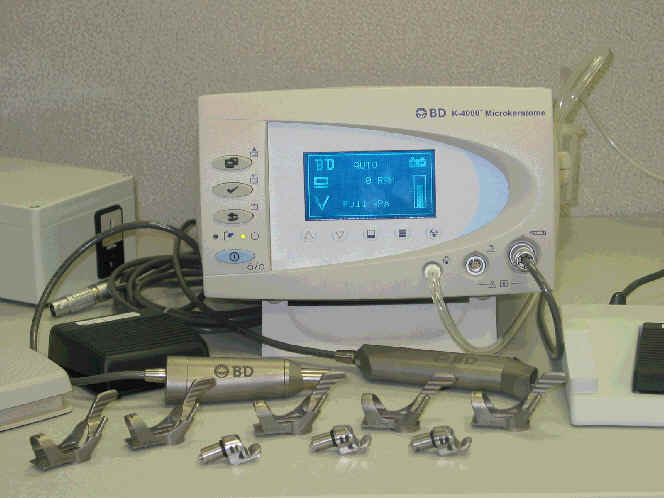|
Rated
highly Quality flap construction made easy with microkeratome |
||
|
Becton
Dickinson K-4000 microkeratome is simple to assemble and operate to create consistent flaps
with excellent visual outcomes with
Robert M. Kershner, MD, FACS San Francisco—The
K-4000 (Becton-Dickinson Ophthalmic Systems, Waltham, MA) is a highly user-friendly,
versatile microkeratome that can reliably to create high-quality flaps of predictable
dimensions, said Robert M. Kershner, MD, at the American Society of Cataract and Refractive
Surgery annual meeting. “The key to
successful LASIK is proper flap construction, and there are a lot of microkeratomes to
select from on the market. However, the BD K-4000 was designed from the ground up as an
instrument for LASIK, and it really seems to give us what we need in flap creation and
visual outcomes,” said Dr. Kershner, who is a private practitioner in Tucson, AZ, and
clinical professor of ophthalmology, Moran Eye Center, University of Utah Health Sciences
Center. “In our
clinical experience, the BD K-4000 has been superior to other microkeratomes in its ease of
assembly and operation, and it creates flaps of consistent quality and thickness, making it
particularly useful when operating on eyes where flap thickness is critical,” he said. Testing
in lab, patient eyes Dr. Kershner reported in testing 100 laboratory eyes and 47 patients, no cases of irregular
flaps or aborted flaps were encountered, and subjective assessments documented the excellent
quality of the flaps and beds. Using a scale of 1 to 5, where 5 is excellent, mean scores
for flap quality, flap edge quality, and bed quality were all 4.7 or 4.8, he said. Flap thickness were measured using in all three available heads—130, 160, and 180 µm. Mean values obtained were 130.2, 160.7, and 181.4 µm, respectively, with standard deviations ranging from 21 to 24 µm.
“With its
dual, independent motors and very tight tolerances in its track and rail system, the BD K-4000 consistently creates
flaps of excellent quality with thickness very
close to the labeled values,” Dr. Kershner said. The quality of
the flaps created with the BD K-4000 were confirmed in the analysis of refractive and visual
outcomes in the clinical series. Preoperatively, mean sphere and cylinder values for the 47
eyes in the study were –5.75 D and +1.20 D, respectively; corresponding postoperative
values were –0.25 D and +0.13D. Mean best-corrected visual acuity (BCVA) was 20/20
preoperatively and mean uncorrected visual acuity (UCVA) postoperatively was 20/18. Reviewing other
features of the BD K-4000, Dr. Kershner noted that both manual and automated handpieces are
available. The keratome is simple to use with a one-handed technique, forward excursion of
the head is activated with a single step on the remote control pedal and the reverse
excursion is automatic. There is no on-eye assembly required. The BD K-4000
also was carefully designed for safety. It has five ring diameters available, ranging in
size between 8 and 10 mm. Surgeons will find that excellent suction is possible even when
using the BD K-4000 on very flat or very steep corneas, in deep set orbits and tight
eyelids. Visibility is
superior during the flap creation process. The keratome has no exposed gears or wheels that
can jam or get caught on eyelashes or eyelids. Because the blade oscillation motor does not
cut in the reverse pass, there is no chatter or bed disruption after the flap is cut. The
oscillation rate, translation speed, and vacuum are continually monitored with on-board
integrated circuitry, and the system shuts down automatically upon detection of problems
that would interfere with acceptable flap creation. Dr. Kershner
noted that his surgical assistants have been pleased with the BD K-4000’s easy assembly,
which is done completely off the eye in a few steps using a special inserter to install the
blade. The automatic preoperative “flight testing” of the BD K-4000, which occurs with
the touch of a console button, is also a welcome feature. “We use a
number of other keratomes at our center and the staff has complained about assembly and
cleaning with each of those devices. They universally prefer the setup and disassembly of
the BD K-4000. My fellows all prefer this keratome over the alternatives, as well” Dr.
Kershner said The BD K-4000 microkeratome. (Photo courtesy of Becton-Dickinson Ophthalmic Systems-Waltham, MA)
Take-home message Ease of assembly and use make the BD K-4000 microkeratome the
unit of choice for Robert M. Kershner, MD, FACS and his staff. Using a scale of 1 to 5,
where 5 is excellent, mean scores for flap quality, flap edge quality, and bed quality were
all 4.7 or 4.8, he noted. |
||


